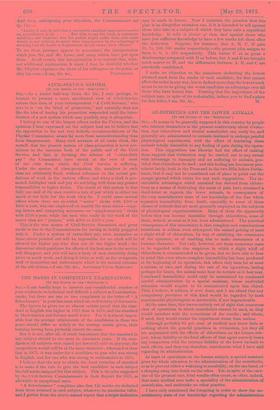CIVIL-SERVICE REFORM.
[TO THE EDITOR OF THE "SPECTATOR.")
Sin,—As a junior half-way down the list, I may, perhaps, be trusted to present a more uncoloured view of Civil-Service reform that than of your correspondent "A Civil Servant," who says he is "on the brink of promotion," and naturally does not like the idea of having his promotion suspended until the intro- duction of a new system which may possibly stop it altogether.
I belong to one of the largest offices under the Crown, and the opinions I hear expressed on the subject lead me to believe that the opposition to the not very definite recommendations of the Playfair Commission arises far more from misunderstanding than from disagreement. Many civil servants of all ranks think, like myself, that the present system of class-promotion is most per- nicious to the interests both of the public and of the Civil Service, and that in devising the scheme of "extra-duty pay" the Commission have struck at the root of most of the evils from which the Civil Service is suffering. Under the system of class-promotion, the numbers in each class are arbitrarily fixed, without reference to the actual gra- dations of work in the various offices, and when a clerk is pro- moted, his higher rank and pay do not bring with them any greater responsibility or higher duties. The result of this system is that fully one-half of the men receive a rate of pay which is either too much or too little for the work they do. I could name several offices where there are so-called " senior " clerks with £500 or £600 a year, who are employed on exactly the same duties—copy- ing letters and computing accounts—as " supplementary " clerks with £100 a year, while the men who really do the work of the senior class are "juniors," with £200 or £300 a year.
This is the true source of Civil-Service discontent, and great credit is due to the Commissioners for having so boldly grappled with it. Under a system of extra-duty pay, such anomalies as those above pointed out will be impossible, for no clerk will be allowed the higher pay who does not do the higher work ; the discontent which paralyses the efforts of the best men in the service will disappear, and you will have a body of men cheerfully doing twice as much work, and doing it twice as well, as the overgrown staff of incapables and malcontents which is the natural outcome of the old system.—I am, Sir, &C., ANOTHER CIVIL SERVANT.


































 Previous page
Previous page